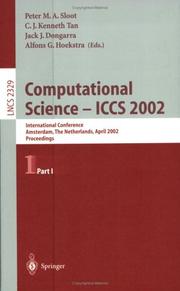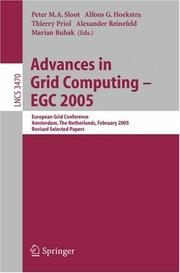| Listing 1 - 7 of 7 |
Sort by
|
Book
ISBN: 3642122027 3642122035 Year: 2010 Publisher: Berlin : Springer,
Abstract | Keywords | Export | Availability | Bookmark
 Loading...
Loading...Choose an application
- Reference Manager
- EndNote
- RefWorks (Direct export to RefWorks)
Deeply rooted in fundamental research in Mathematics and Computer Science, Cellular Automata (CA) are recognized as an intuitive modeling paradigm for Complex Systems. Already very basic CA, with extremely simple micro dynamics such as the Game of Life, show an almost endless display of complex emergent behavior. Conversely, CA can also be designed to produce a desired emergent behavior, using either theoretical methodologies or evolutionary techniques. Meanwhile, beyond the original realm of applications - Physics, Computer Science, and Mathematics – CA have also become work horses in very different disciplines such as epidemiology, immunology, sociology, and finance. In this context of fast and impressive progress, spurred further by the enormous attraction these topics have on students, this book emerges as a welcome overview of the field for its practitioners, as well as a good starting point for detailed study on the graduate and post-graduate level. The book contains three parts, two major parts on theory and applications, and a smaller part on software. The theory part contains fundamental chapters on how to design and/or apply CA for many different areas. In the applications part a number of representative examples of really using CA in a broad range of disciplines is provided - this part will give the reader a good idea of the real strength of this kind of modeling as well as the incentive to apply CA in their own field of study.
Cellular automata --- Engineering & Applied Sciences --- Mathematics --- Physical Sciences & Mathematics --- Computer Science --- Algebra --- Cellular automata. --- Computers, Iterative circuit --- Iterative circuit computers --- Structures, Tessellation (Automata) --- Tessellation structures (Automata) --- Computer science. --- Computer simulation. --- System theory. --- Computer mathematics. --- Computational intelligence. --- Computer Science. --- Simulation and Modeling. --- Complex Systems. --- Computational Science and Engineering. --- Computational Intelligence. --- Statistical Physics and Dynamical Systems. --- Intelligence, Computational --- Artificial intelligence --- Soft computing --- Computer mathematics --- Discrete mathematics --- Electronic data processing --- Systems, Theory of --- Systems science --- Science --- Computer modeling --- Computer models --- Modeling, Computer --- Models, Computer --- Simulation, Computer --- Electromechanical analogies --- Mathematical models --- Simulation methods --- Model-integrated computing --- Informatics --- Philosophy --- Parallel processing (Electronic computers) --- Pattern recognition systems --- Sequential machine theory --- Engineering. --- Statistical physics. --- Construction --- Industrial arts --- Technology --- Physics --- Mathematical statistics --- Statistical methods --- Dynamical systems. --- Dynamical systems --- Kinetics --- Mechanics, Analytic --- Force and energy --- Mechanics --- Statics --- Mathematical physics. --- Computer Modelling. --- Theoretical, Mathematical and Computational Physics. --- Data processing. --- Physical mathematics

ISBN: 3540435913 9783540435914 354043593X 9783540435938 3540435948 9783540435945 3540460438 3540460802 3540477896 Year: 2002 Publisher: Berlin, Heidelberg : Springer Berlin Heidelberg : Imprint: Springer,
Abstract | Keywords | Export | Availability | Bookmark
 Loading...
Loading...Choose an application
- Reference Manager
- EndNote
- RefWorks (Direct export to RefWorks)
Computational Science is the scienti?c discipline that aims at the development and understanding of new computational methods and techniques to model and simulate complex systems. The area of application includes natural systems – such as biology, envir- mental and geo-sciences, physics, and chemistry – and synthetic systems such as electronics and ?nancial and economic systems. The discipline is a bridge b- ween ‘classical’ computer science – logic, complexity, architecture, algorithms – mathematics, and the use of computers in the aforementioned areas. The relevance for society stems from the numerous challenges that exist in the various science and engineering disciplines, which can be tackled by advances made in this ?eld. For instance new models and methods to study environmental issues like the quality of air, water, and soil, and weather and climate predictions through simulations, as well as the simulation-supported development of cars, airplanes, and medical and transport systems etc. Paraphrasing R. Kenway (R.D. Kenway, Contemporary Physics. 1994): ‘There is an important message to scientists, politicians, and industrialists: in the future science, the best industrial design and manufacture, the greatest medical progress, and the most accurate environmental monitoring and forecasting will be done by countries that most rapidly exploit the full potential ofcomputational science’. Nowadays we have access to high-end computer architectures and a large range of computing environments, mainly as a consequence of the enormous s- mulus from the various international programs on advanced computing, e.g.
Computer science --- Computational complexity --- Computer science. --- Computer communication systems. --- Software engineering. --- Computers. --- Computer mathematics. --- Physics. --- Computer Science. --- Theory of Computation. --- Software Engineering/Programming and Operating Systems. --- Mathematics of Computing. --- Computer Communication Networks. --- Computational Mathematics and Numerical Analysis. --- Theoretical, Mathematical and Computational Physics. --- Mathematics. --- Natural philosophy --- Philosophy, Natural --- Physical sciences --- Dynamics --- Computer mathematics --- Discrete mathematics --- Electronic data processing --- Automatic computers --- Automatic data processors --- Computer hardware --- Computing machines (Computers) --- Electronic brains --- Electronic calculating-machines --- Electronic computers --- Hardware, Computer --- Computer systems --- Cybernetics --- Machine theory --- Calculators --- Cyberspace --- Computer software engineering --- Engineering --- Communication systems, Computer --- Computer communication systems --- Data networks, Computer --- ECNs (Electronic communication networks) --- Electronic communication networks --- Networks, Computer --- Teleprocessing networks --- Data transmission systems --- Digital communications --- Electronic systems --- Information networks --- Telecommunication --- Cyberinfrastructure --- Network computers --- Informatics --- Science --- Mathematics --- Distributed processing --- Information theory. --- Communication theory --- Communication --- Computer science—Mathematics. --- Mathematical physics. --- Physical mathematics --- Physics --- Computer networks.
Book
ISBN: 9783642122033 9783642263675 9783642122026 9783642122040 Year: 2010 Publisher: Berlin Heidelberg Springer Berlin Heidelberg Imprint Springer
Abstract | Keywords | Export | Availability | Bookmark
 Loading...
Loading...Choose an application
- Reference Manager
- EndNote
- RefWorks (Direct export to RefWorks)
Deeply rooted in fundamental research in Mathematics and Computer Science, Cellular Automata (CA) are recognized as an intuitive modeling paradigm for Complex Systems. Already very basic CA, with extremely simple micro dynamics such as the Game of Life, show an almost endless display of complex emergent behavior. Conversely, CA can also be designed to produce a desired emergent behavior, using either theoretical methodologies or evolutionary techniques. Meanwhile, beyond the original realm of applications - Physics, Computer Science, and Mathematics - CA have also become work horses in very different disciplines such as epidemiology, immunology, sociology, and finance. In this context of fast and impressive progress, spurred further by the enormous attraction these topics have on students, this book emerges as a welcome overview of the field for its practitioners, as well as a good starting point for detailed study on the graduate and post-graduate level. The book contains three parts, two major parts on theory and applications, and a smaller part on software. The theory part contains fundamental chapters on how to design and/or apply CA for many different areas. In the applications part a number of representative examples of really using CA in a broad range of disciplines is provided - this part will give the reader a good idea of the real strength of this kind of modeling as well as the incentive to apply CA in their own field of study.
Discrete mathematics --- Mathematical statistics --- Mathematics --- Classical mechanics. Field theory --- Statistical physics --- Computer science --- Artificial intelligence. Robotics. Simulation. Graphics --- Computer. Automation --- neuronale netwerken --- fuzzy logic --- cybernetica --- grafentheorie --- vormgeving --- computers --- informatica --- statistiek --- mineralen (chemie) --- simulaties --- mijnbouw --- informaticaonderzoek --- KI (kunstmatige intelligentie) --- fysica --- dynamica
Book

ISBN: 9783540320364 Year: 2005 Publisher: Berlin Heidelberg Springer Berlin Heidelberg
Abstract | Keywords | Export | Availability | Bookmark
 Loading...
Loading...Choose an application
- Reference Manager
- EndNote
- RefWorks (Direct export to RefWorks)
When the network is as fast as the computer's internal links, the - chine disintegrates across the net into a set of special purpose app- ances. (George Gilder) We are proud to present to you the proceedings of the European Grid C- ference 2005, held at the Science Park Amsterdam during February 14-16. TheaimoftheEuropeanGridConferencewastobethepremiereventon Grid computing in Europe in 2005, focusing on all aspects of Grid computing and bringing together participants from research and industry. EGC 2005 was a follow-up of the Across Grids Conferences held in Santiago de Compostela, Spain (2003) and in Nicosia, Cyprus (2004). We decided to have three main tracks during this conference: one with pe- reviewed scienti?c contributions, one with presentations from business and - dustry,and one event track with presentations from European and national Grid projects. In order to guarantee high-quality proceedings, we put extensive e?ort into reviewing the scienti?c papers and processing the proceedings. We received over 180 papers from which, after peer review by 2-3 reviewers each, we selected 70 for oral presentations and52 for posterpresentations duringthescienti?c tracks. In this book you ?nd the ?nal versions of these accepted papers. AftertheconferenceopeningbytheDeanoftheFacultyofScienceoftheU- versity of Amsterdam, Prof. Dr. K.J.F Gaemers, we enjoyed a series of inspiring keynote lectures and two parallel scienti?c tracks over three days.
Complex analysis --- Discrete mathematics --- Computer science --- Programming --- Computer architecture. Operating systems --- Computer. Automation --- discrete wiskunde --- complexe analyse (wiskunde) --- informatica --- programmeren (informatica) --- software engineering --- OS (operating system) --- computernetwerken

ISBN: 3540269185 Year: 2005 Publisher: Berlin Springer
Abstract | Keywords | Export | Availability | Bookmark
 Loading...
Loading...Choose an application
- Reference Manager
- EndNote
- RefWorks (Direct export to RefWorks)
Book
Year: 2004 Publisher: Berlin, Heidelberg : Springer Berlin Heidelberg : Imprint: Springer,
Abstract | Keywords | Export | Availability | Bookmark
 Loading...
Loading...Choose an application
- Reference Manager
- EndNote
- RefWorks (Direct export to RefWorks)
Book
Year: 2004 Publisher: Berlin, Heidelberg : Springer Berlin Heidelberg : Imprint: Springer,
Abstract | Keywords | Export | Availability | Bookmark
 Loading...
Loading...Choose an application
- Reference Manager
- EndNote
- RefWorks (Direct export to RefWorks)
| Listing 1 - 7 of 7 |
Sort by
|

 Search
Search Feedback
Feedback About UniCat
About UniCat  Help
Help News
News